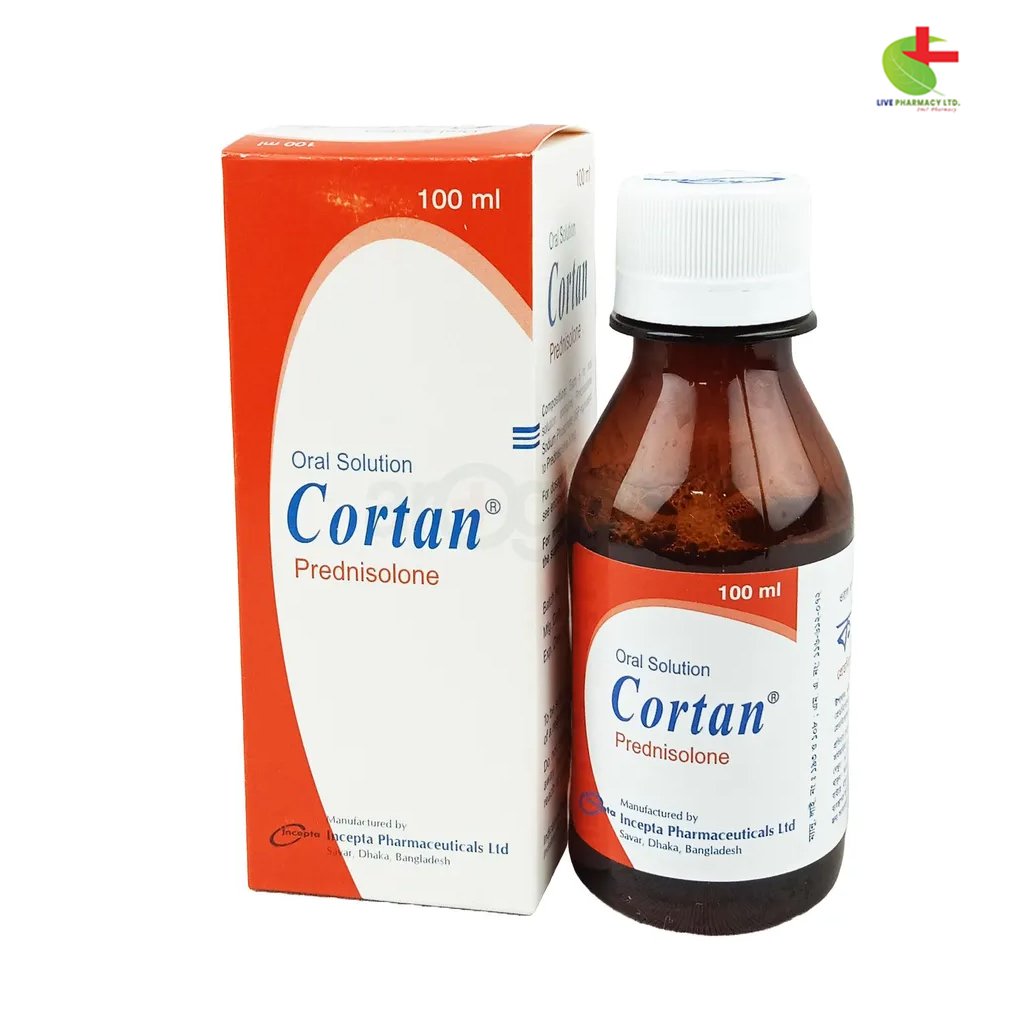Cortan 100ml
95.00৳ Bottle (50ml)
- Prednisolone is a synthetic corticosteroid with strong anti-inflammatory and immunosuppressive properties.
- It works by inhibiting the Phospholipase A2 enzyme, reducing the production of inflammatory mediators like leukotrienes and prostaglandins.
- Prednisolone is commonly used to treat conditions like arthritis, severe allergies, asthma, and certain autoimmune or inflammatory disorders.
- It is rapidly absorbed after oral intake, metabolized in the liver, and excreted through urine.
 Brand
Brand
|
Incepta Pharmaceuticals Ltd |
|---|---|
 Generics
Generics
|
Prednisolone |
 Type
Type
|
Oral Solution |
Indications
Rheumatic Disorders: Effective for managing conditions like psoriatic arthritis, rheumatoid arthritis (including juvenile forms), ankylosing spondylitis, acute bursitis, nonspecific tenosynovitis, acute gouty arthritis, and post-traumatic osteoarthritis.
Endocrine Disorders: Suitable for treating primary and secondary adrenocortical insufficiency, congenital adrenal hyperplasia, nonsuppurative thyroiditis, and hypercalcemia linked to cancer.
Dermatologic Conditions: Addresses severe skin issues such as pemphigus, bullous dermatitis herpetiformis, severe erythema multiforme, exfoliative dermatitis, mycosis fungoides, and chronic psoriasis.
Allergic Reactions: Used in managing seasonal or perennial allergic rhinitis, asthma, contact and atopic dermatitis, serum sickness, and drug-related hypersensitivity reactions.
Respiratory Issues: Beneficial for conditions like symptomatic sarcoidosis, berylliosis, fulminant pneumonitis, and aspiration pneumonitis.
Hematologic Disorders: Effective for idiopathic thrombocytopenic purpura, secondary thrombocytopenia, autoimmune hemolytic anemia, and erythroblastopenia.
Edematous Conditions: Prescribed to induce diuresis or remission of proteinuria in nephrotic syndrome (without uremia) due to idiopathic causes or lupus erythematosus.
Gastrointestinal Diseases: Treats ulcerative colitis and regional enteritis.
Always take medications as prescribed by a registered physician.
Pharmacology
Prednisolone is a synthetic corticosteroid with potent glucocorticoid effects. It inhibits the enzyme Phospholipase A2, which reduces inflammatory mediators such as leukotrienes, prostaglandins, and SRS-A. It is quickly absorbed after oral intake, with 70-90% protein-binding in plasma, and has a half-life of 2-4 hours. It is primarily metabolized in the liver and excreted via urine.
Dosage & Administration
Adults:
- Nephrotic Syndrome:
- Initial: 2 mg/kg/day (maximum 80 mg/day) in 3-4 divided doses until urine is protein-free for 3 consecutive days (maximum 28 days).
- Maintenance: 1-1.5 mg/kg/dose every other day for 4 weeks. Maintenance dose for 3-6 months: 0.5-1 mg/kg every other day.
- Anti-inflammatory: 5-60 mg daily, divided into 1-4 doses.
- Acute Asthma: 40-60 mg/day in a single or divided dose for 3-10 days.
- Allergic Conditions:
- Day 1: 10 mg before breakfast, 5 mg after lunch, dinner, and 10 mg at bedtime.
- Day 2-6: Gradually tapering doses as prescribed.
Pediatric:
- Asthma (based on age group):
- 1 year: Acute: 10 mg every 12 hours. Maintenance: 10 mg every other day.
- 1-4 years: Acute: 20 mg every 12 hours. Maintenance: 20 mg every other day.
- 5-12 years: Acute: 30 mg every 12 hours. Maintenance: 30 mg every other day.
- 12 years and older: Acute: 40 mg every 12 hours. Maintenance: 40 mg every other day.
- Anti-inflammatory: 0.05 to 2 mg/kg/day, divided into 1-4 doses.
- Immunosuppression: 0.05 to 2 mg/kg/day, divided into 1-4 doses.
Always take medications as prescribed by a registered physician.
Interactions
Cortan’s effectiveness may be reduced by medications like Aminoglutethimide, antacids, barbiturates, carbamazepine, and rifampin. It can lower potassium levels, potentially causing cardiac arrhythmias when taken with Digitalis. Immunizations should be administered with caution.
Contraindications
Cortan is contraindicated in systemic infections unless specific anti-infective treatments are used. It should not be taken by individuals allergic to its ingredients or those with ocular herpes simplex due to the risk of corneal perforation.
Side Effects
Common side effects include increased appetite, indigestion, and restlessness. Less frequent side effects may include skin discoloration, dizziness, facial flushing, and excessive sweating.
Pregnancy & Lactation
Prednisolone should only be used during pregnancy if deemed essential by your doctor, as it may pose risks to the fetus. Corticosteroids can pass into breast milk and could affect infant growth or cortisol production.
Precautions & Warnings
Caution is advised in patients with diabetes, hypertension, psychological disorders, osteoporosis, pregnancy, post-menopause, or chronic kidney disease. Long-term use may lead to Cushing’s syndrome, hyperglycemia, muscular weakness, delayed healing, and susceptibility to infections.
Overdose
Adverse effects from prednisone typically develop after prolonged, excessive dosing. If overdose symptoms occur, the dosage should be gradually reduced under medical supervision.
Therapeutic Class
Glucocorticoids.
Storage Conditions
Store in a cool, dry place, away from light and out of reach of children.













Reviews
There are no reviews yet.